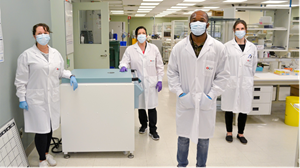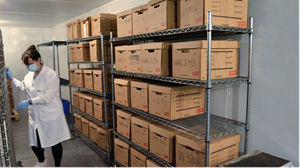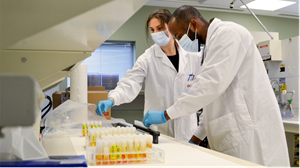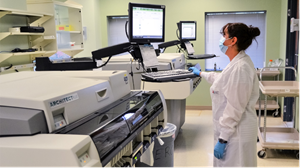This blog was
originally published on Canadian Blood Services’ R.E.D. blog on October 20, 2020.
Author: Catherine Lewis
It was a Friday night in June when Craig Jenkins got the urgent call from Dr. Chantale Pambrun, director of Canadian Blood Services’ Centre for Innovation.
“She asked, ‘What’s the likelihood we can test 10,000 samples in the first week?’” remembers Jenkins, senior manager of product and process development at the Centre for Innovation.
The next morning, he, Dr. Pambrun, and senior medical lab technologist Valerie Conrod were in the Ottawa lab, and they clocked 14-hour days all week to meet the target for Canada’s first study to determine the prevalence of COVID-19 antibodies in Canadians’ blood. The level of a pathogen in a population, as measured in blood serum, is known as its “seroprevalence.”
Back in April 2020, when the federal government established the COVID-19 Immunity Task Force, Canadian Blood Services and our Quebec counterpart, Héma-Québec, reached out to offer assistance. Since then, Canadian Blood Services’ seroprevalence lab has tested more than 60,000 blood samples for COVID-19 antibodies and is providing valuable information to Canadian health officials and policymakers. The samples come from blood donations across Canada.
 Lab team members Valerie Conrod, Stacey Vitali, Andy Tshiula Kalenga and Carissa Kohnen support the work of Canada’s Immunity Task Force to provide the data needed to understand the scale of COVID-19 infection in Canada.
Lab team members Valerie Conrod, Stacey Vitali, Andy Tshiula Kalenga and Carissa Kohnen support the work of Canada’s Immunity Task Force to provide the data needed to understand the scale of COVID-19 infection in Canada.
But getting the study going was no easy feat. It meant setting up a new lab, new technology, new processes and training new staff. Jenkins is known for his can-do attitude, and together with a team of likeminded people, Canadian Blood Services was able to get the seroprevalence study up and running in a fraction of the time it would normally take while still adhering to the high quality standards needed to conduct such a study.
“There’s always a way to get something done if you want to bad enough,” Jenkins says. “We knew this was a way we at Canadian Blood Services could help, and in those first weeks, we determined that we would do what we needed to make it happen.”
Since that first week, the lab — which now has four staff — has been running an average of 2,400 tests per day.

Thousands of frozen samples await testing in the lab's walk-in freezer at Canadian Blood Services.
The lab space in which the team is working had actually been slated for closure, but the group transformed it into a functional seroprevalence lab in a matter of weeks. Specialized equipment needed to be acquired, and in some cases retrofitted or reprogrammed for its new purpose. A walk-in freezer needed to be ready and reliable.
However, the pandemic also brought a sudden demand for very specific, sometimes surprising, items, and supply chain disruptions for others. For most of us, it was toilet paper missing from grocery store shelves. For the seroprevalence lab, it was a specific pipette tip that was essential for the testing but in short supply.
The shortage put the study at risk of a two-week delay. Luckily, Jenkins’ contact at the supplier was able to arrange for Canadian Blood Services to borrow a few boxes of the tips and return them a few weeks later after the full shipment arrived. We had the opportunity to return the favour when another organization needed pipette tips weeks later, and we had them in abundance.

Carissa Kohnen and Andy Tshiula Kalenga prepare samples for testing
“When you try to do something that’s out of the norm, many people are quick to tell you why you can’t do it,” Jenkins says. “It takes a different mindset to say that this is something that’s valuable for us to be doing, so what will it take for it to happen? And then you make it happen.”
Canadian Blood Services has been able to respond with agility to the needs of Canadians in the constantly changing context of the COVID-19 pandemic. We are grateful for the opportunity to contribute in new ways, including through the ongoing seroprevalence study as well as our role in national clinical trials examining whether COVID-19 convalescent plasma could be a safe and effective treatment option for patients with the virus.

Senior medical lab technologist Valerie Conrod operates the high-throughput analyzer that tests the samples for COVID-19 antibodies.
The opinions reflected in this post are those of the author and do not necessarily reflect the opinions of Canadian Blood Services nor do they reflect the views of Health Canada or any other funding agency.
Your comments are encouraged!!
This blog is moderated and comments will be published upon approval.